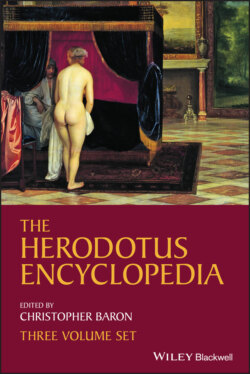Читать книгу The Herodotus Encyclopedia - Группа авторов - Страница 559
ARCHILOCHUS (Ἀρχίλοχος, ὁ)
ОглавлениеCHARLES C. CHIASSON
University of Texas at Arlington
Archilochus was a poet from the island of PAROS, active in the second half of the seventh century BCE, whose fragmentary verses address a wide variety of topics, project a passionate but unsentimental persona, and demonstrate great poetic skill (including a notorious gift for invective). Herodotus cites Archilochus only once (1.12), for mentioning the contemporary Lydian king GYGES SON OF DASCYLUS (c. 680–644) in a poem—a citation ostensibly intended to help Herodotus’ Greek AUDIENCE identify a long‐deceased foreign monarch.
In one of his best‐known narratives, Herodotus tells how Gyges founded the Mermnad dynasty by killing CANDAULES and marrying his widowed queen (1.8–12). At the end of the story, Herodotus describes Gyges as one “whom in fact Archilochus of Paros, living at the same time, mentioned in an iambic trimeter poem” (1.12.2). (Four lines of the poem survive: see Gerber 1999 F19.) The authenticity of this citation has been questioned: Asheri (in ALC, 84) considers it a post‐Herodotean interpolation because of its “technical” metrical terminology, and because no such clarification would have been necessary for a king as well known as Gyges was during Herodotus’ day. However, there are parallels for Herodotus’ specifying the meter or genre of poetic sources that he cites (e.g., SAPPHO at 2.135, SOLON at 5.113.2), possibly to indicate the degree of their historical RELIABILITY (Boedeker 2000). Moreover, the historical grounding provided by Archilochus’ contemporary witness initiates a transition between the “mythical” narrative mode of the Gyges story (whose details are scarcely factual) and the “historical” narrative mode of its sequel, the political agreement brokered by DELPHI between the Lydians and Gyges’ partisans (Baragwanath 2019).
SEE ALSO: Authority, Narrative; Lydia; Mermnadae; Poetry
